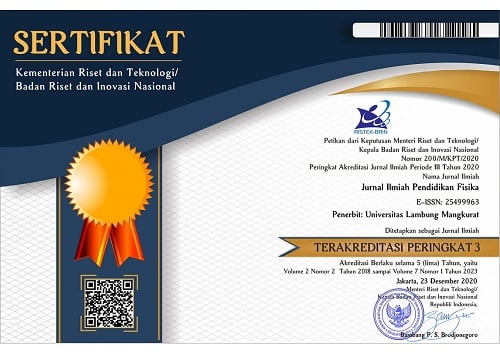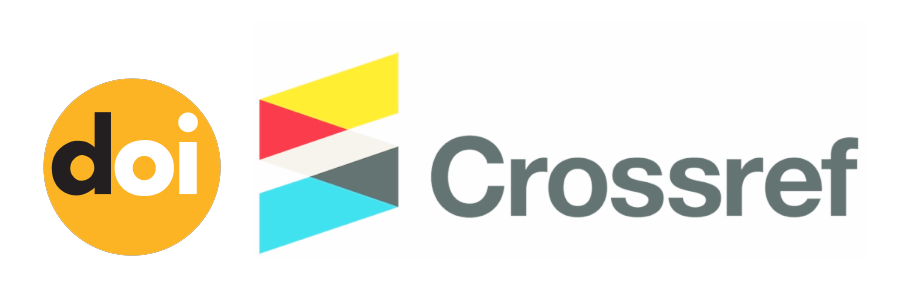Effectiveness of E-Magazine Teaching Materials on Global Warming Materials Phase E
Abstract
The independent curriculum requires teaching materials with technological development innovations, including e-magazine teaching materials. E-magazine teaching materials are teaching materials in the form of electronic magazines that can be accessed using mobile phones. The advantage of e-magazine teaching materials is that presenting interesting material with pictures and videos can increase students' interest in physics. This study aims to determine the effectiveness of electronic magazine teaching materials on student learning outcomes in the global warming material phase E of SMAN 6 Padang. The type of research conducted is quasi-experimental. The design used in the study was Randomized Control Group Only Design. The population in the study is all phase E classes of SMAN 6 Padang in the 2023/2024 school year. In this study, 2 sample classes were used with purposive sampling techniques, namely the experimental and control classes. In the learning experiment class, the learning uses e-magazine teaching materials; the learning control class uses printed teaching materials at school. The research results showed that e-magazine teaching materials effectively improve student learning outcomes on global warming materials in the independent curriculum.
Keywords
Full Text:
PDFReferences
Abas, Z. W. (2015). Fostering learning in the 21 st century through student engagement. International Journal for Educational Media and Technology, 9(1), 3–15.
Akanbi, A. O. (2020). Availability and utilization of e-learning facilities in the teaching of Senior School Physics in Ilorin, Nigeria. Journal of Education and Learning (EduLearn), 14(3), 331–337. https://doi.org/10.11591/edulearn.v14i3.16342
Amin, A. K., Degeng, N. S., Setyosari, P., & Djatmika, E. T. (2021). The effectiveness of mobile blended problem based learning on mathematical problem solving. International Journal of Interactive Mobile Technologies, 15(1), 119–141. https://doi.org/10.3991/IJIM.V15I01.17437
Anuar, Z., Mufit, F.,& Sundari, P. (2024). The effect implementasi a case study-based learning model on student learning outcomes at sman 2 pulau punjung. Physics Learning and Education, 2(3).
Anunobi, A., Njedeka, V., Gambari, G., Isiaka, A., Abdullahi, A., Bashiru, M., Alabi, A., & Omotayo, T. (2018). Development and validation of web-based courseware for junior secondary school basic technology students in nigeria. Journal of Education and Learning (EduLearn), 12(1), 74–83. https://doi.org/10.11591/edulearn.v12i1.5163
Anusba, E. B., Sundari, P. D., Hidayati, H., & Sari, S. Y. (2023). Inovasi modul digital berbasis poe untuk memfasilitasi kemampuan pemahaman konsep kinematika siswa. Jurnal Pendidikan Mipa, 13(3), 663–669. https://doi.org/10.37630/jpm.v13i3.1145
Anwariningsih, S. H., & Ernawati, S. (2013). Development of interactive media for ict learning at elementary school based on student self learning. Journal of Education and Learning (EduLearn), 7(2), 121–128. https://doi.org/10.11591/edulearn.v7i2.226
Ardianti, R., Sujarwanto, E., & Surahman, E. (2021). Problem-based learning: Apa dan bagaimana. Diffraction: Journal for Physics Education and Applied Physics, 3(1), 27–35. https://doi.org/10.37058/diffraction.v3i1.4416
Baro’ah, S. (2020). Kebijakan merdeka belajar sebagai strategi peningkatan mutu pendidikan. Jurnal Tawadhu, 4(1), 1063–1073.
Demirel, M., & Dağyar, M. (2016). Effects of problem-based learning on attitude: A meta-analysis study. Eurasia Journal of Mathematics, Science and Technology Education, 12(8), 2115–2137. https://doi.org/10.12973/eurasia.2016.1293a
Duri, R. N., Dewi, W. S., Hufri, & Hidayati. (2024). Pengembangan e-lkpd berbasis problem based learning pada materi gelombang bunyi yang memuat keterampilan berfikir kritis siswa. Jurnal Pendidikan Tambusai, 8(1), 9481–9489.
Fandos-Herrera, C., Jiménez-Martínez, J., Orús, C., Pérez-Rueda, A., & Pina, J. M. (2023). The influence of personality on learning outcomes and attitudes: The case of discussants in the classroom. International Journal of Management Education, 21(1). https://doi.org/10.1016/j.ijme.2022.100754
Fitri, N. R., Afrizon, R., Hidayati, & Hufri. (2022). Meta-analysis of the influence of ICT based physics learning media on the learning outcomes of senior high school students. Pillar of Physics Education, 14(4), 274–282.
González-Pérez, L. I., & Ramírez-Montoya, M. S. (2022). Components of education 4.0 in 21st century skills frameworks: Systematic review. Sustainability, 14(3), 1493.
Hussin, A. A. (2018). Education 4.0 made simple: Ideas for teaching. International Journal of Education and Literacy Studies, 6(3), 92. https://doi.org/10.7575/aiac.ijels.v.6n.3p.92
Ilahi, T. D. W., Mufit, F., Hidayati, H., & Afrizon, R. (2021). Disain dan validitas multimedia interaktif berbasis konflik kognitif pada materi vektor untuk kelas x sma/ma. Jurnal Penelitian Pembelajaran Fisika, 12(2), 182–195. https://doi.org/10.26877/jp2f.v12i2.9324
Kumar, B. A., & Mohite, P. (2016). Usability guideline for Mobile Learning Apps: ann empirical study. International Journal of Mobile Learning Ang Organisation, 10(4), 223–237.
Lapenia, M., & Hidayati, H. (2023). Analisis butir soal ujicoba posttest untuk mengukur hasil belajar dan pemahaman siswa pada materi fluida. Jurnal Pendidikan Tambusai, 7(3), 22935–22943.
Mufit, F., Hendriyani, Y., Usmeldi, Dhanil, M., & Tanjung, M. R. (2023). The effectiveness of smartphone-based interactive multimedia integrated cognitive conflict models to improve 21st-century skills. International Journal of Information and Education Technology, 13(11), 1793–1801. https://doi.org/10.18178/ijiet.2023.13.11.1991
Munawaroh. (2020). The influence of problem-based learning model as learning method, and learning motivation on entrepreneurial attitude. International Journal of Instruction, 13(2), 431–444. https://doi.org/10.29333/iji.2020.13230a
Ningsih, L. S., Afrizon, R., & Hidayati, H. (2019). Analisis validasi bahan ajar fisika bermuatan literasi saintifik pada materi alat-alat optik dan pemanasan global. Pillar of Physics Education, 12(3), 545–552.
Paroza, N., & Hidayati, H. (2023). Analisis kebutuhan pengembangan e-magazine berbasis android pada materi pemanasan global untuk siswa kelas x sma. Jurnal Pendidikan Tambusai, 7(2), 16633–16640.
Roemintoyo, R., & Budiarto, M. K. (2021). Flipbook as innovation of digital learning media: Preparing education for facing and facilitating 21st century learning. Journal of Education Technology, 5(1), 8. https://doi.org/10.23887/jet.v5i1.32362
Rohmah, A., Saputra, H. J.,& Listyarini, I. (2020). Pengembangan e-magazine berbasis android dalam pembelajaran kelas v sekolah dasar. Jurnal Pendidikan Dan Pembelajaran Ke-SD-An, 7(2).
Roza, M., Lufri, L., Andromeda, A., & Mufit, F. (2022). Science teacher’s perception of digital technology-based learning in the 21st century. Jurnal Pendidikan Progresif, 12(1), 281–293. https://doi.org/10.23960/jpp.v12.i1.202222
Sari, S. Y., Sundari, P. D., Jhora, F. U., & Hidayati, H. (2020). Studi hasil bimbingan teknis pengembangan perangkat pembelajaran berbasis keterampilan abad-21 dalam rangka penerapan program merdeka belajar. Jurnal Eksakta Pendidikan (Jep), 4(2), 189.
https://doi.org/10.24036/jep/vol4-iss2/527
Shantri, Z. G. (2020). Advantages and disadvantages of using information technology in learning process of student. Journal of Turkish Science Education, 17(3), 420–428.
Sholihah, T. M., & Lastariwati, B. (2020). Problem based learning to increase competence of critical thinking and problem solving. Journal of Education and Learning (EduLearn), 14(1), 148–154. https://doi.org/10.11591/edulearn.v14i1.13772
Srikandi, N., Putra, I. A., Ayu, N., & Pertiwi, S. (2019). Majalah elektronik materi rambatan kalor untuk meningkatkan minat belajar peserta didik. DIiffraction: Journal for Physics Education and Applied Physics, 2(1), 1–8. http://jurnal.unsil.ac.id/index.php/Diffraction
Sugiyono, S. (2018). Metode penelitian kuantitatif, kualitatif, dan R&D. PT Alfabeta.
Suryana, I. K. P., Suastra, I. W., & Suma, K. (2023). Mengatasi learning loss. Jurnal Review Pendidikan Dan Pengajaran, 6(4), 578–584.
Sutarto., Hastuti, I. D., Guillen., D. F., Garay, J. P. P., Hernandez, R. M.,& Namaziandost, E. (2022). The effect of problem-based learning on metacognitive ability in the conjecturing process of junior high school students. Education Research International.
Wartono, W., Suyudi, A., & Batlolona, J. R. (2018). Students’ problem solving skills of physics on the gas kinetic theory material. Journal of Education and Learning (EduLearn), 12(2), 319–324. https://doi.org/10.11591/edulearn.v12i2.8424
Yandi, A., Nathania Kani Putri, A., & Syaza Kani Putri, Y. (2023). Faktor-faktor yang mempengarui hasil belajar peserta didik (Literature review). Jurnal Pendidikan Siber Nusantara, 1(1), 13–24. https://doi.org/10.38035/jpsn.v1i1.14
DOI: https://doi.org/10.20527/jipf.v8i3.13154
Refbacks
- There are currently no refbacks.
Indexed by: Jurnal Ilmiah Pendidikan Fisika is licensed under a creative commons attribution-share alike 4.0 international license
Statistics Counter |
















